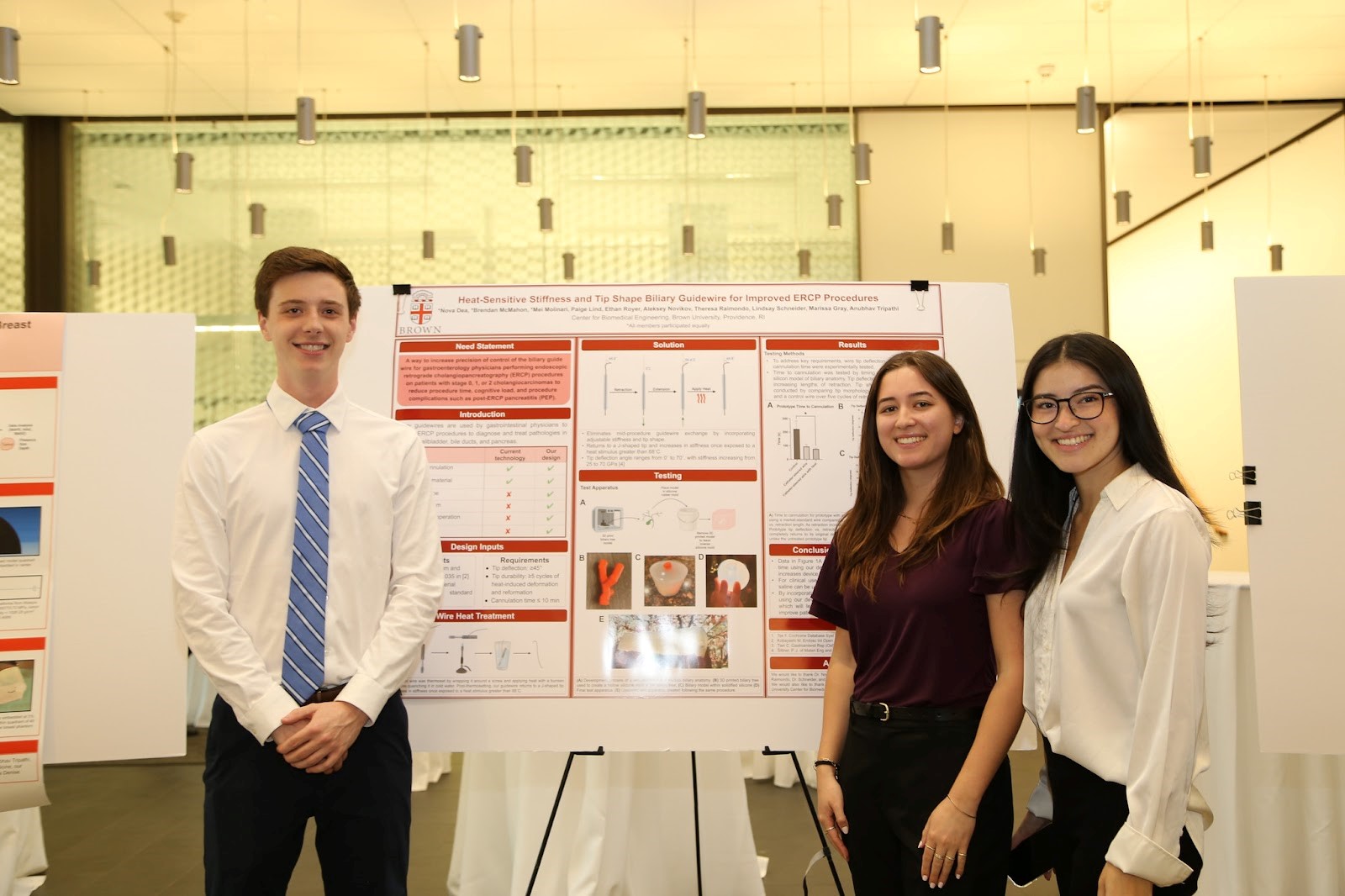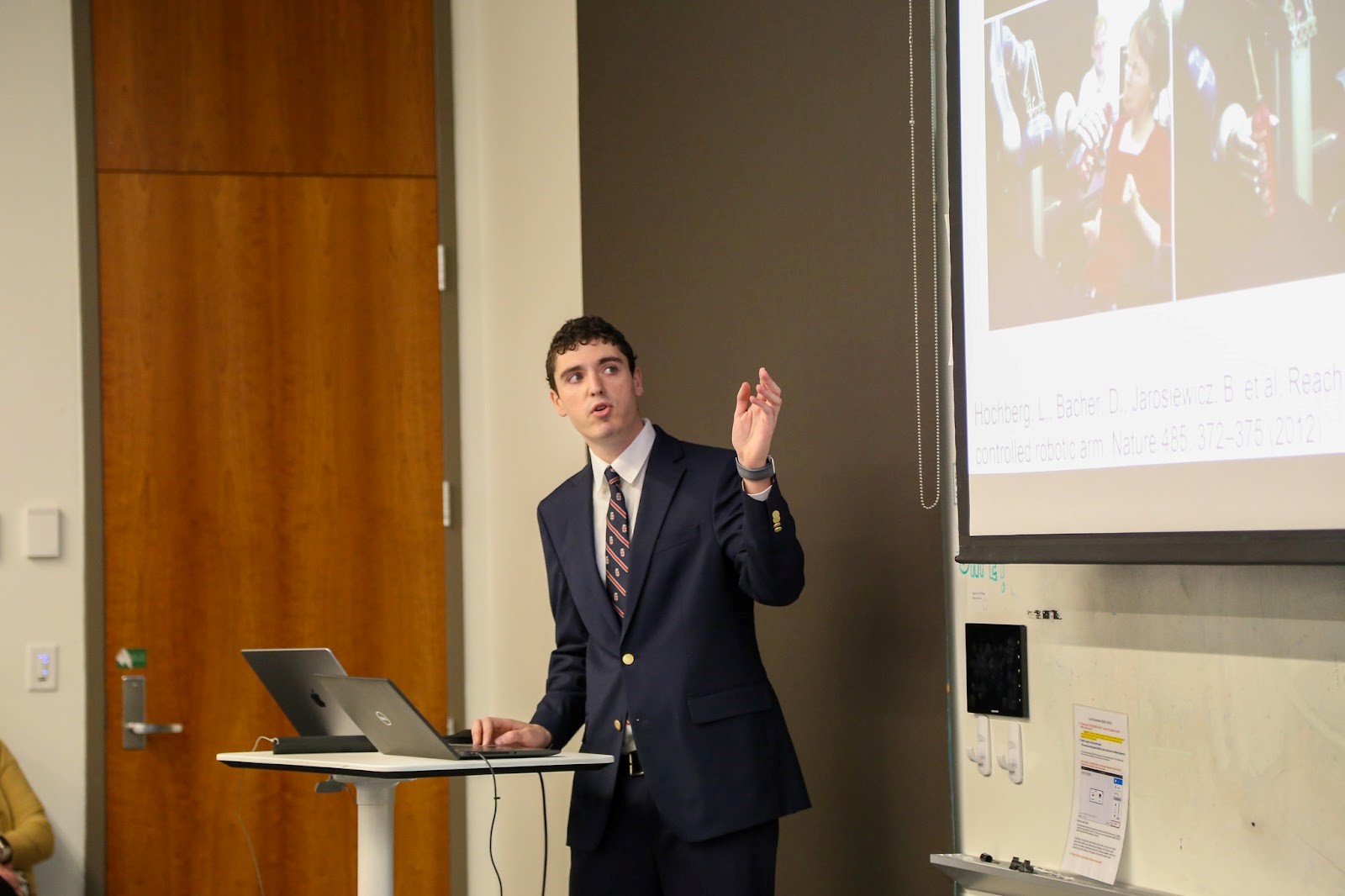Engineering’s Brendan McMahon ’24 and Benjamin Schornstein ’24 are among a group of Brown University students who have received Fulbright awards for the 2024-25 academic year to conduct independently designed research projects or teach English in locations across the globe. McMahon plans to teach English in Taiwan for a year, and following that he will work in healthcare software at Epic Systems. Schornstein will do research at the NeuroRestore lab in Lausanne, Switzerland to learn more about designing brain-computer interfaces to restore movement for individuals with tetraplegia, before returning to the U.S. to further his degree.
McMahon will earn his biomedical engineering degree in May. While at Brown, he worked in the Borton Laboratory as a research assistant, played the French horn in the university orchestra and headed the copy desk at the Brown Daily Herald.
Additionally, he began taking Mandarin classes in his fifth semester, and continued learning all he could about Taiwanese and Chinese culture throughout his time on College Hill through Afternoon Tea Times (to learn about social customs and cuisine), celebrating Lunar New Year and Mid-Autumn Festival (learning about their history and significance), and attending guest speaker events on China-Taiwan relations.
As an English teaching assistant in Taiwan next year, McMahon will advance the Fulbright mission to aid in developing a deep understanding of the world’s diverse
cultures. He will rely upon past experiences teaching young students as a music instructor, STEM teacher and camp counselor, combining his interests in education, Mandarin language, and cultural understanding,
McMahon hopes his return to the U.S. comes with a thorough understanding of Taiwanese culture and improved leadership skills, as he begins his pursuit of a career in global engineering operations. His goal is to learn more about manufacturing differences and use improved teaching skills to educate future generations of engineers in efforts to develop a more collaborative technological landscape.
“Further entrenching myself in this learning environment, finding a common thread between my Mandarin professors and my future Taiwanese community, and distilling and adapting these pedagogical methods will benefit my future in global technology,” he said. “Because of Taiwan’s major role in current technological advancement, having an understanding of the educational traditions that grow and maintain this status is rare and valuable insight. The Fulbright opportunity will equip me with these key aspects, bolstering me as a key voice in U.S.-Taiwanese tech relations at a time when collaboration and understanding are so crucially important.”
 Schornstein will graduate with degrees in both computer engineering and neuroscience in May, having joined the BrainGate lab in the fall of 2022 after learning about the impact of BCIs (brain-computer interfaces) in Professors Arto Nurmikko and Leigh Hochberg’s Neuroengineering course. Schornstein’s goal is ultimately to attend an M.D./Ph.D. program to continue work on brain-computer interfaces in a clinical setting.
Schornstein will graduate with degrees in both computer engineering and neuroscience in May, having joined the BrainGate lab in the fall of 2022 after learning about the impact of BCIs (brain-computer interfaces) in Professors Arto Nurmikko and Leigh Hochberg’s Neuroengineering course. Schornstein’s goal is ultimately to attend an M.D./Ph.D. program to continue work on brain-computer interfaces in a clinical setting.
As a Fulbright Scholar, he will spend the year in the NeuroRestore Laboratory with Dr. Grégoire Courtine. The NeuroRestore laboratory is one of the only labs that is combining implantable BCI and spinal cord stimulation as a rehabilitation technique, and already has an established clinical trial at University Hospital of Lausanne and, within the past year, has been successful at restoring a participant’s ability to walk. Dr. Courtine’s lab also consists of postdocs and Ph.D. students from around the world, offering a diverse range of ideas and perspectives on brain-computer interfaces and spinal cord stimulation that cannot be found anywhere else in the world.
Schornstein’s work in Hochberg’s lab at Brown, as part of the BrainGate team, has included utilizing robotic devices to restore upper motor control for individuals with tetraplegia. He has also served as the Meta Teaching Assistant in the Computer Science department, as head teaching assistant for 4 classes including ENGN1220 (Neuroengineering) and CSCI1410 (Artificial Intelligence), and as the ground software lead for Brown Space Engineering.
“During my undergraduate studies, I worked directly with paralyzed individuals and, through the use of a soft robotic glove, enabled them to regain control of reach and grasp movements,” he said. “By continuing this line of work at the NeuroRestore lab in Lausanne, I will explore an alternative means to restore arm mobility in people with spinal cord injury. I will collaborate with other research scientists in Switzerland and take advantage of sophisticated models to develop better representations regarding how our brain directs our thoughts and actions.”
Schornstein ultimately plans to become a physician-scientist, bridging the gap between clinical care and research in computational neuroscience by building devices and developing novel methods to treat chronic neurological disease or injury.
Brown has ranked as one of the top three student Fulbright producers in the nation for the past eight years, earning the highest spot on the list in 2021, 2018, 2017 and 2016; the No. 2 rank in 2023, 2020, and 2019; and the No. 3 spot in 2022. The U.S. Department of State, which oversees the Fulbright U.S. Student Program, will release data for the 2024-25 award cycle next spring.
The School of Engineering at Brown has produced eight Fulbright winners in the past eight years, including Leanne Block ’17 (France), Isabelle Bauman ’19 (Denmark), Hope McGovern ’19 (Austria), Kit Sum Wu ’19 (Japan), Julia Henke ’22 (Nepal) and Mariah Guevara ’23 (Spain).
Founded in 1946, the Fulbright program promotes international peace through intellectual and cultural exchange. Applicants are selected based upon their academic and professional records, the quality and achievability of their proposals, and their capacity to engage culturally with their host communities.